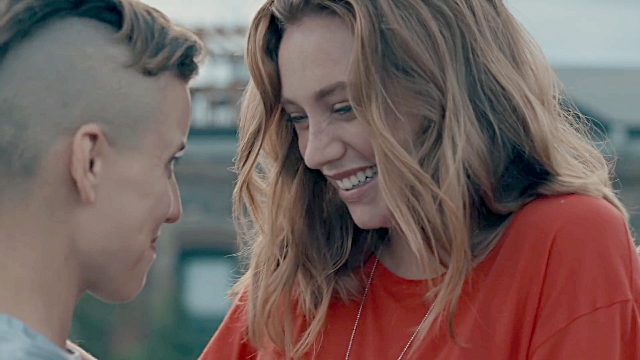Princess Cyd Movie Review & Film Summary
Share
Perhaps you have ever experienced a quiet, selfless moment of serenity with someone you care about that seems boundless and out-of-this-world? Not that neurotic kind of devotion that we call love, but instead a warm space that requires nothing and gracefully offers everything to the other person. If you have, Stephen Cone’s excellent 2017 theatre film will remind you of what that feels like. In the event that you haven’t, you’ll be dying to re-watch Princess Cyd just so you can get another glimpse of the unique and humbling feeling.
Cyd Loughlin (Jessie Pinnick) is a freckled, carefree teen who has just lost her brother and mother to suicide. Facing the darker areas of the individual brain head-on, the 16-year-old woman now must proceed to Chicago and is pretty much pressured to live with her aunt, Miranda Ruth (Rebecca Spence) for three weeks. The last mentioned is a renowned novelist who is not only a bookworm, but a celibate as well. Yet, she is also a skilled and eloquent Christian with interesting insights about spirituality and sexuality, making her a lot more complex than your stereotypical literary “nerd”.
Both women’s first encounter is blunt, campy and uncomfortable. Just like a bull in a China shop, Cyd assaults her feminine relative with gutsy questions about her sex life and prolonged abstinence. As an open-minded young woman who “prefers everything”, the teenager is as amazed to discover Miranda doesn’t genuinely have sex as her aunt is to discover that she “doesn’t really read”. Cyd can’t quite cover her mind around the thought of a sex hit and quickly assails the woman with judgments and glary, contrived appears (not unlike the audiences themselves). What follows is Cone’s genius and Spence’s undiluted on-screen brilliance as Miranda goes into an almost-soliloquy about fulfilment, societal norms and embracing life in every of its forms. It really is at this moment that the director’s maturity and his entire task with this film are uncovered – Cone stunningly depicts the alchemy of struggling, showing his viewers that you could work through pain and stress and still be pleased to be alive and completely immersed in living. That you can take the misery out of a history event, however negative, and transmute it into meaning, courage and goodness. All this in the context of human associations and mainly the relationships between women.

A whole lot is condensed in Princess Cyd’s modest 90 minutes, which inevitably leads for some loose leads to terms of narrative plot. There is not much closure in Cyd’s romantic relationship with Katie Sauter (Malic White), the hearty, Mo-hawked barista from the neighborhood coffee shop. There can be an example of attempted sexual assault that’s not explicitly and completely pondered. The death of Cyd’s mother and Miranda’s sister and its own effects on both women’s lives are never discussed. But this is not an act of avoidance on Cone’s part. His movie is not meant to deny the adversity, cruelty and misfortunes of life, but instead to see if we can in some way gracefully slide through the breaks of your time untarnished and thankful for what we do have and for being able to experience anything at all, even pain. In addition, the film’s concentrate is invariably on its individuals and their inner development, not really much on their exterior circumstances. It is hard to assume a more energetic, sublime and intricate couple of lead performances because of this year’s LGBT cinema than that of Rebecca Spence and Jessie Pinnick.
A vast majority of movies today concentrate on what’s incorrect with the world. The cultural injustice, the savagery people treat each other with, the grief of shedding family members or your own identification, the insanity of the people. Liberating and cathartic, this kind of cinema is definitely useful in forcing us to identify our shortcomings and how exactly we can do better, but it rarely works well for making us feel less unpleasant about ourselves and the world while we are positively trying to change it. Cone’s film is meek, irenic and honest. It doesn’t press a certain plan onto the viewers, it doesn’t intrude on the character types once they are launched and it doesn’t favor or part with one perspective or another. It really is simple, yet powerful. It acknowledges injury, societal anticipations and the evil of the world, but it chooses to raise above it, to exceed it. Not in a cliché, immature way, however in an extremely real and significant way, that triggers you to question if feeling miserable should be area of the process of change, if you already know the direction you’re proceeding in and are taking the necessary steps to get there.











Follow US